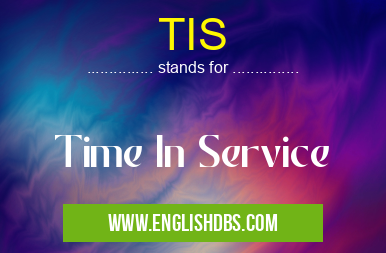What does TIS mean in MILITARY
Time In Service (TIS) is a term used in government and military to refer to the total amount of time that an employee or service member has been employed by their respective institution. This time period can range from a few weeks or months up to decades or more for long-serving members of the services. The length of this service is important in determining an individual's rank, pay grade, benefits, and retirement eligibility. TIS is often used as an indicator of experience and expertise within a specific organization, which can influence decision-making processes such as promotion, assignment selection, and career opportunity.

TIS meaning in Military in Governmental
TIS mostly used in an acronym Military in Category Governmental that means Time In Service
Shorthand: TIS,
Full Form: Time In Service
For more information of "Time In Service", see the section below.
» Governmental » Military
Definition & Explanation
Time In Service (TIS) refers to the cumulative amount of time that a person has spent working for the same agency or military unit. For example, a soldier who has been enlisted in the Army for 13 years would have 13 years TIS. Similarly, an employee who has worked for the same company for five years would have five years TIS with that specific company. TIS is important in many areas related to employment and advancement opportunities within organizations as it can often be seen as a measure of experience and dedication. It is also considered when determining job promotions, bonuses, and pension eligibility calculations for employees or service members reaching certain milestones in their careers.
Examples & Usage
The use of TIS is essential in helping employers assess potential applicants when hiring new staff members or assigning roles within existing departments. Having a longer period of Time In Service than other applicants demonstrates longevity with one particular organization which may indicate a certain level of loyalty and dedication over others with shorter TIS periods. It allows employers to accurately measure previous experience levels within their individuals profiles while allowing them to make accurate decisions about role assignments and placement within teams based on their performance reviews during those given timespans throughout their careers thus far.
Essential Questions and Answers on Time In Service in "GOVERNMENTAL»MILITARY"
What is TIS?
TIS stands for Time In Service. It is the length of time an individual has served in the military.
How long is a typical TIS period?
Typically, a TIS period is 4 years for enlisted personnel and 2 to 3 years for officers.
Are there exceptions to the standard TIS period?
Yes, there are certain exceptions to the standard TIS periods. These include individuals who have completed additional rigorous training, such as specialized education courses or combat tours.
Does every service member have a different TIS period?
Generally speaking, no; although depending on their circumstances it may vary slightly from one individual to another.
Does a long TIS period give any advantages to members of the military?
Yes, longer time in service typically gives an individual more responsibility and greater leadership opportunities within their unit or organization. Additionally, having a longer time in service indicates greater commitment and dedication to the military which can be advantageous when being considered for promotion or other opportunities.
Is there any way to shorten my TIS period?
Most commonly, individuals can accelerate their commissioning process by completing Officer Candidate School (OCS) prior to the completion of their bachelor’s degree. This allows them to potentially advance their career by reducing their time in service as an officer by up to two years.
Is there an advantage of having shorter versus longer TIS periods?
There can be both advantages and disadvantages associated with shortening your time in service versus extending it out further. The primary benefit of having a shorter term is that you can potentially advance more quickly than someone with a longer term due to less competition within your rank or position; however you may miss out on seniority benefits or longevity pay that could have been awarded with additional years dedicated to service. Ultimately it depends on your goals and objectives as a service member when determining whether or not shorter vs longer terms are most beneficial.
What types of experiences count toward meeting my minimum required TIS period?
Experiences such as deployments, extended technical training courses, specialized educational courses completed during your enlistment may all count towards meeting the requirements for minimal required Time In Service (TIS).
Does serving overseas count towards my TIS period?
Yes, serving overseas as part of a combat tour will typically count towards meeting the requirements specified in order to receive credit for your Time In Service (TIS). However this may vary based on specific regulations set forth within each branch of service so you should check with your chain-of-command before proceeding with deployment plans.
Final Words:
Time In Service (TIS) plays an integral role in managing personnel within organizations across the world due its ability to accurately measure how much time has been spent with one particular employer providing invaluable insight into performance levels as well as dedication levels among staff members looking for promotion eligibility or seasonal assignments within departments during peak periods throughout their workspan so far in order to meet customer needs without compromising other integral business goals like profit margins or market share standings against rival competitors.
TIS also stands for: |
|
| All stands for TIS |
